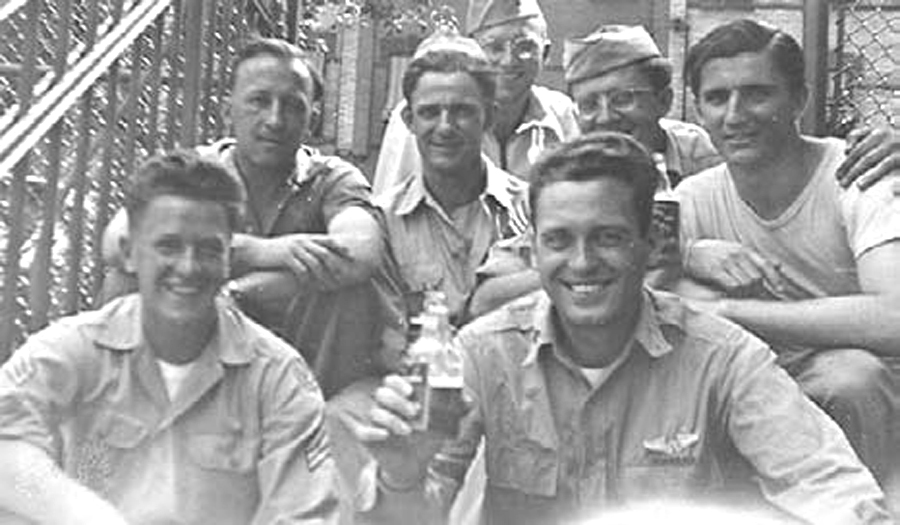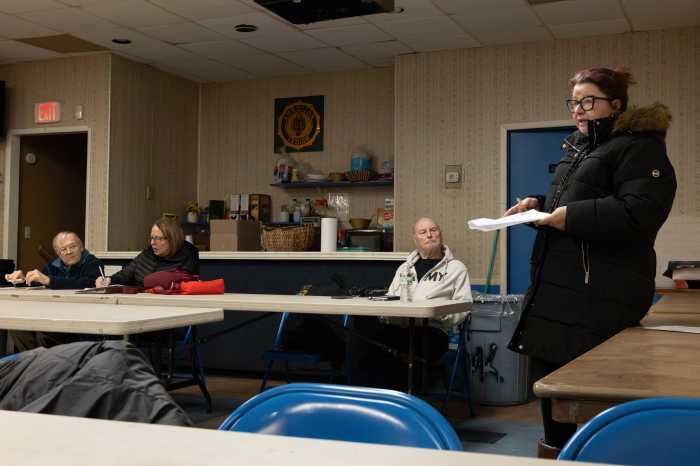Throughout World War II, the Ridgewood Times proudly featured pages upon pages of stories of survival and heroism focused on local men on the front lines in Europe and the Pacific.
As Veterans Day approaches, we’re proud to share with you some of these stories that we’ve come across in our research of Ridgewood Times archives in the winter of 1945 — as the Allied Forces were advancing rapidly toward victory over Nazi Germany in Europe, and getting closer to triumph over Imperial Japan.
One such story appeared in the Feb. 16, 1945, issue of the Ridgewood Times. The headline alone, “Ridgewood GI saved his life by stepping on land mine,” seems almost too incredible to be true.
Yet the article written by Corporal Nino LoBello — a longtime Ridgewood Times columnist in service to the Armed Forces at the time — tells the remarkable tale of how one of Ridgewood’s own survived a brush with death on the battlefield in France.
“Not very many American soldiers can say that they had their lives saved by stepping on an enemy land mine, but Pfc. William Muller of Ridgewood is home today — alive and on furlough — merely because he had the “good fortune” to step on a German Teller Anti-Personnel Mine in France.
Private Muller, an infantryman with the 29th Division, lost his right foot and ankle last summer near St. Lo. He was evacuated to England and eventually was shipped to Percy Jones General Hospital in Battle Creek, Mich., where he underwent final surgery to prepare him for his artificial leather foot. He is the son of Mr. and Mrs. Peter Muller of 1870 Menahan St.
What happened to him at the front was described yesterday by the local GI.
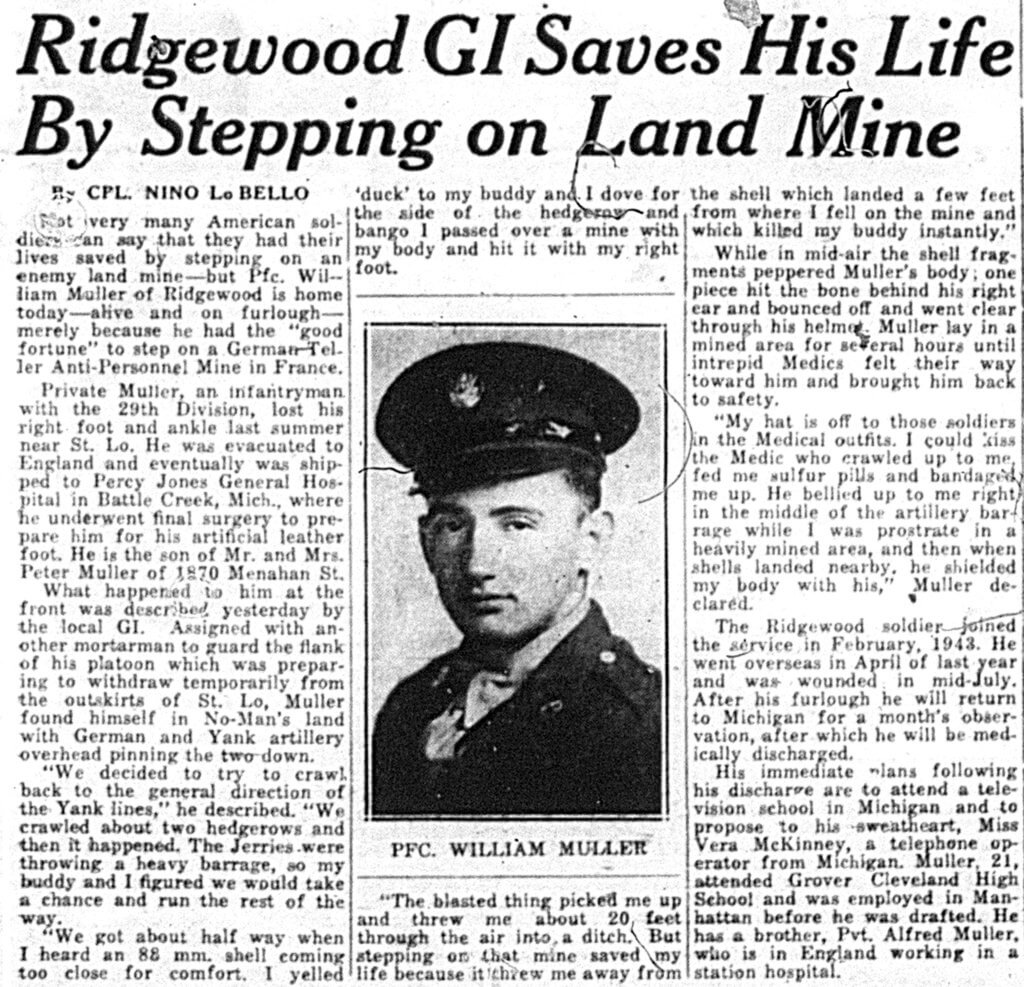
Assigned with another mortarman to guard the flank of his platoon, which was preparing to withdraw temporarily from the outskirts of St. Lo, Muller found himself in No-Man’s land with German and Yank artillery overhead, pinning the two down.
“We decided to try and crawl back to the general direction of the Yank lines,” he described. “We crawled about two hedgerows and then it happened. The Jerries [a nickname the troops used for the German forces] were throwing a heavy barrage, so my buddy and I figured we would take a chance and run the rest of the way.
“We got about halfway when I heard an 88 mm. Shell coming too close for comfort. I yelled ‘duck’ to my buddy and I dove for the side of the hedgerow, and bang-o, I passed over a mine with my body and hit it with my right foot.
“The blasted thing picked me up and threw me about 20 feet through the air into a ditch. But stepping on that mine saved my life, because it threw me away from the shell which landed a few feet from where I fell on the mine, and which killed my buddy instantly.”
While in mid-air, the shell fragments peppered Muller’s body; one piece hit the bone behind his right ear and bounced off and went clear through his helmet.
Muller lay in a mined area for several hours until intrepid medics felt their way toward him and brought him back to safety.
“My hat is off to those soldiers in the medical outfits. I could kiss the medic who crawled up to me, fed me sulfur pills and bandaged me up. He bellied up to me right in the middle of the artillery barrage while I was prostrate in a heavily mined area, and then when shells landed nearby, he shielded my body with his,” Muller declared.
The Ridgewood soldier joined the service in February 1943. He went overseas in April of last year and was wounded in mid-July. After his furlough, he will return to Michigan for a month’s observation, after which he will be medically discharged.
His immediate plans following his discharge are to attend a television school in Michigan and to propose to his sweetheart, Miss Vera McKinney, a telephone operator from Michigan.
Muller, 21, attended Grover Cleveland High School and was employed in Manhattan before he was drafted. He has a brother, Pvt. Alfred Muller, who is in England working in a station hospital.
* * *
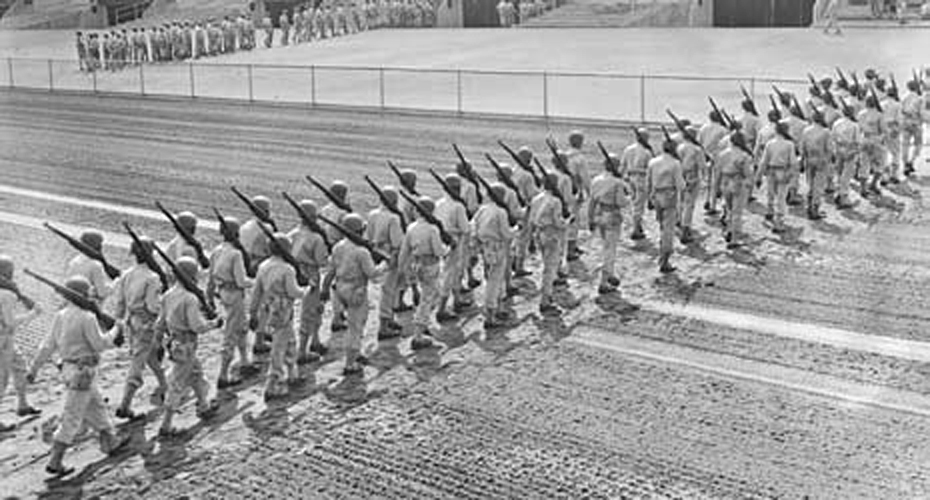
Another proud story which the Ridgewood Times ran on March 23, 1945, focused on another hero of the war from Ridgewood, who received honors for bravely delivering food to American soldiers while under heavy attack in Europe.
With the 39th Infantry Regiment in Germany, Staff Sergeant John J. Martin of Ridgewood was awarded the Bronze Star Medal here recently for meritorious service in connection with military operations against the enemy in the European Theater of Operations.
Sergeant Martin is a mess sergeant of Company C, 39th Infantry Regiment. He was inducted into the Armed Forces Jan. 17, 1941, and joined Company C on April 30, 1941.
During the present European campaign, he has repeatedly showed himself to be a competent and aggressive combat soldier. Despite the adverse combat conditions and a limited variety of food, he successfully supervised the preparation of hot nourishing meals, insuring at all times that the troops were well fed.
Time and again, he has exposed himself to enemy artillery and small arms fire to help carry these hot meals to the men in forward combat areas. This aggressive initiative and devotion to duty has won him the highest respect from the officers and men of his company.
In addition to the Bronze Star Medal, he also wears the European-African-Middle East Campaign Ribbon with five bronze battle stars, Distinguished Unit Badge, Oak Leave Cluster to the Distinguished UnitBadge, American Defense Service Ribbon, Combat Infantryman’s Badge, and the Good Conduct Medal.
Staff Sergeant Martin is the son of Mr. and Mrs. John Martin, 6044 Catalpa Ave.
* * *
The front page of the May 4, 1945, Ridgewood Times — published just four days before Nazi Germany surrendered unconditionally — featured a story of how a captain from Glendale accepted the white flag from a Nazi general.
His many Glendale friends and neighbors were thrilled by the news that Capt. Henry J. Abbes, of 70-39 69th Pl., had the distinction of having Lieutenant General Kurt Dittmar, ranking officer of the Nazi high command and military spokesman for the Wehrmacht, surrender to him.
The story was told in dispatches from Ninth Army headquarters at Magdeburg.
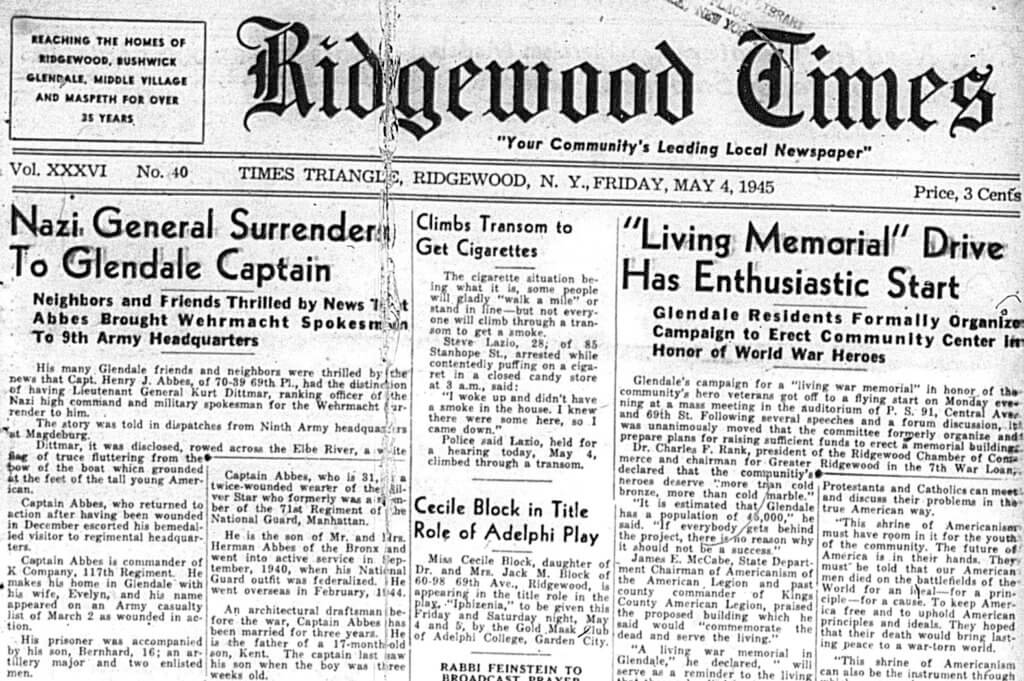
Dittmar, it was disclosed, rowed across the Elbe River, a white flag of truce fluttering from the bow of the boat which grounded at the feet of the tall young American.
Captain Abbes, who returned to action after having been wounded in December, escorted his bemedaled visitor to regimental headquarters.
Captain Abbes is commander of K Company, 117th Regiment. He makes his home in Glendale with his wife, Evelyn, and his name appeared on an Army casualty list of March 2 as wounded in action.
His prisoner was accompanied by his son, Bernhard, 16; an artillery major; and two enlisted men.
Captain Abbes, who is 31, is a twice-wounded wearer of the Silver Star who formerly was a member of the 71st Regiment of the National Guard, Manhattan.
He is the son of Mr. and Mrs. Herman Abbes of the Bronx and went into active service in September 1940, when his National Guard outfit was federalized. He went overseas in February 1944.
An architectural draftsman before the war, Captain Abbes has been married for three years. He is the father of a 17-month-old son, Kent. The captain last saw his son when the boy was three weeks old.
* * *
If you have any remembrances or old photographs of “Our Neighborhood: The Way It Was” that you would like to share with our readers, please write to the Old Timer, c/o Ridgewood Times, 38-15 Bell Blvd., Bayside, NY 11361, or send an email to editorial@qns.com. Any print photographs mailed to us will be carefully returned to you upon request.

